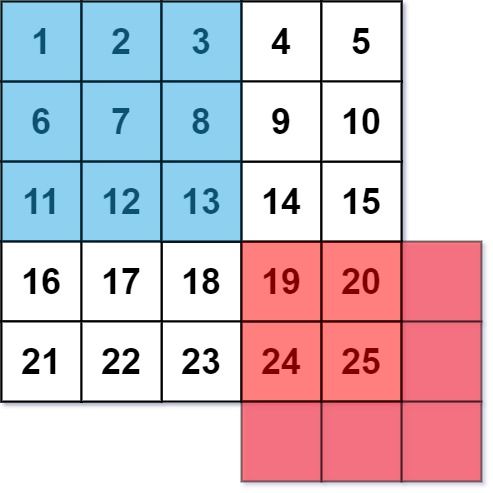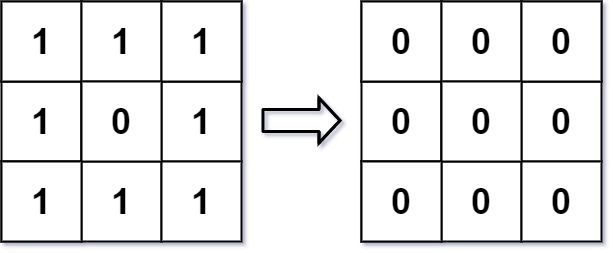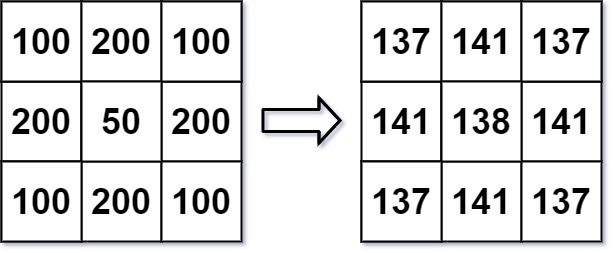| comments | difficulty | edit_url | tags | ||
|---|---|---|---|---|---|
true |
Easy |
|
An image smoother is a filter of the size 3 x 3 that can be applied to each cell of an image by rounding down the average of the cell and the eight surrounding cells (i.e., the average of the nine cells in the blue smoother). If one or more of the surrounding cells of a cell is not present, we do not consider it in the average (i.e., the average of the four cells in the red smoother).
Given an m x n integer matrix img representing the grayscale of an image, return the image after applying the smoother on each cell of it.
Example 1:
Input: img = [[1,1,1],[1,0,1],[1,1,1]] Output: [[0,0,0],[0,0,0],[0,0,0]] Explanation: For the points (0,0), (0,2), (2,0), (2,2): floor(3/4) = floor(0.75) = 0 For the points (0,1), (1,0), (1,2), (2,1): floor(5/6) = floor(0.83333333) = 0 For the point (1,1): floor(8/9) = floor(0.88888889) = 0
Example 2:
Input: img = [[100,200,100],[200,50,200],[100,200,100]] Output: [[137,141,137],[141,138,141],[137,141,137]] Explanation: For the points (0,0), (0,2), (2,0), (2,2): floor((100+200+200+50)/4) = floor(137.5) = 137 For the points (0,1), (1,0), (1,2), (2,1): floor((200+200+50+200+100+100)/6) = floor(141.666667) = 141 For the point (1,1): floor((50+200+200+200+200+100+100+100+100)/9) = floor(138.888889) = 138
Constraints:
m == img.lengthn == img[i].length1 <= m, n <= 2000 <= img[i][j] <= 255
class Solution:
def imageSmoother(self, img: List[List[int]]) -> List[List[int]]:
m, n = len(img), len(img[0])
ans = [[0] * n for _ in range(m)]
for i in range(m):
for j in range(n):
s = cnt = 0
for x in range(i - 1, i + 2):
for y in range(j - 1, j + 2):
if 0 <= x < m and 0 <= y < n:
cnt += 1
s += img[x][y]
ans[i][j] = s // cnt
return ansclass Solution {
public int[][] imageSmoother(int[][] img) {
int m = img.length;
int n = img[0].length;
int[][] ans = new int[m][n];
for (int i = 0; i < m; ++i) {
for (int j = 0; j < n; ++j) {
int s = 0;
int cnt = 0;
for (int x = i - 1; x <= i + 1; ++x) {
for (int y = j - 1; y <= j + 1; ++y) {
if (x >= 0 && x < m && y >= 0 && y < n) {
++cnt;
s += img[x][y];
}
}
}
ans[i][j] = s / cnt;
}
}
return ans;
}
}class Solution {
public:
vector<vector<int>> imageSmoother(vector<vector<int>>& img) {
int m = img.size(), n = img[0].size();
vector<vector<int>> ans(m, vector<int>(n));
for (int i = 0; i < m; ++i) {
for (int j = 0; j < n; ++j) {
int s = 0, cnt = 0;
for (int x = i - 1; x <= i + 1; ++x) {
for (int y = j - 1; y <= j + 1; ++y) {
if (x < 0 || x >= m || y < 0 || y >= n) continue;
++cnt;
s += img[x][y];
}
}
ans[i][j] = s / cnt;
}
}
return ans;
}
};func imageSmoother(img [][]int) [][]int {
m, n := len(img), len(img[0])
ans := make([][]int, m)
for i, row := range img {
ans[i] = make([]int, n)
for j := range row {
s, cnt := 0, 0
for x := i - 1; x <= i+1; x++ {
for y := j - 1; y <= j+1; y++ {
if x >= 0 && x < m && y >= 0 && y < n {
cnt++
s += img[x][y]
}
}
}
ans[i][j] = s / cnt
}
}
return ans
}function imageSmoother(img: number[][]): number[][] {
const m = img.length;
const n = img[0].length;
const locations = [
[-1, -1],
[-1, 0],
[-1, 1],
[0, -1],
[0, 0],
[0, 1],
[1, -1],
[1, 0],
[1, 1],
];
const res = [];
for (let i = 0; i < m; i++) {
res.push([]);
for (let j = 0; j < n; j++) {
let sum = 0;
let count = 0;
for (const [y, x] of locations) {
if ((img[i + y] || [])[j + x] != null) {
sum += img[i + y][j + x];
count++;
}
}
res[i].push(Math.floor(sum / count));
}
}
return res;
}impl Solution {
pub fn image_smoother(img: Vec<Vec<i32>>) -> Vec<Vec<i32>> {
let m = img.len();
let n = img[0].len();
let locations = [
[-1, -1],
[-1, 0],
[-1, 1],
[0, -1],
[0, 0],
[0, 1],
[1, -1],
[1, 0],
[1, 1],
];
let mut res = vec![];
for i in 0..m {
res.push(vec![]);
for j in 0..n {
let mut sum = 0;
let mut count = 0;
for [y, x] in locations.iter() {
let i = (i as i32) + y;
let j = (j as i32) + x;
if i < 0 || i == (m as i32) || j < 0 || j == (n as i32) {
continue;
}
count += 1;
sum += img[i as usize][j as usize];
}
res[i].push(sum / count);
}
}
res
}
}

